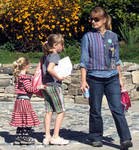Day 13
6 x 6 for Sixth Grade: Ecology & Ecosystems
Vocabulary
Frog Heaven; Ecology
of Vernal Pool
Doug Wechsler
1. Ecology: A branch
of biology dealing with the relations between organism and there environment
2. Ecosystem: The system for ecology; the system or circle
of the environment
3. Metamorphose: To be capable of undergoing a change in
form or nature
4. Terrestrial: Pertaining to the earth as distinct from
other plants
5. Amphibian: Amphibians are a class of vertebrae animals including
animals such as frogs, salamanders, exc.
6. Food web: A food web or food cycle depicts feeding
connections to an ecological community
Sentences
1. Ecology is important to learn about because it teaches
people that if you take one thing away from the world (or if something goes
extinct) the animal or plant that it eats would overflow.
2. At the farm, there are a lot of eco-systems, such as the
pond, the gardens, and the birds.
3. Butterfly’s and frogs both go through a metamorphose from
children to adults.
4. Terrestrial living things have a whole different
ecosystem than water related living things.
5. All amphibians are born in water and breathe with gills
but later change to be terrestrial.
6. The food web for our pond contains of the plants the
rocks and the animals.
Details/ Facts
1. There are thousands of different ecosystems on Earth
2. Including coral reefs, temperate rain forests, small
ponds, and dessert grasslands
3. Ecosystems can be very small like the community of
insects under a rock, to a very large community
4. Healthy ecosystems naturally promote diversity in species
5. While the terms "ecosystem" and
"biome" are often used interchangeably, biomes in fact are larger
than ecosystems and contain multiple, often interacting, ecosystems within them
6. Many organizations now take taken action to protect the
planet's various ecosystems
Questions
1. What kind of ecosystem do we have in our yard that you
will study and observe? A: our ponds
2. What are the participants of the food web in the pond’s
ecosystem? A: insects, the fish, the frogs, the cats, the birds
3. Why is it important to learn about ecosystems? A: Because
it teaches you that every animal and every living thing cannot survive without
another living thing
4. What are some other examples of ecosystems? A: Our pond,
The Ocean, The Jungle, African savannahs
5. What other kinds of animals besides frogs experience
metamorphosis? A: caterpillars to butterfly’s
6. Write a poem describing and summarizing the pond
ecosystem:
Once there was a pond
Full of little fish,
And frogs and bugs, and other things
That birdies love to dish,
Everything was perfect
Everything was fine,
Until a little bird came down
And thought it was time to dine,
He swooped down to the water,
And then he made a wish,
Oh please, Oh please, Oh please can I,
Just catch this tiny fish?
Of course he did,
But he almost missed ‘em
He would’ve if it wasn’t,
for the eco-system
While he was eating that little fish
The birdie had a thought,
What would it be like if all the birdies,
EVER GOT CAUGHT!
All the fish in that little pond
would fill the whole thing up!
Cause no one was there to eat them
No one was there for sup!
I’m glad we have the eco-system
The Birdie said to Tim,
But then a bigger birdie,
Came down and ate HIM!
Math
1. Pentagon: a five side shape that looks like a house
2. Hexagon: a six side shape that looks like a barn
3. Heptagon: a seven sided shape that looks like a homemade
ice cream maker
4. Octagon: An eight side shape that to me looks like an
octopus head
5. Nonagon: A nine side shape that looks like a button
6. decagon: A ten side shape that looks like a bumpy circle
Current Events
1.
Corrosive Oceans: Carbon Emissions Threaten Ecosystem
August 22, 2008
http://abcnews.go.com/Technology/story?id=5626308&page=1
2. http://www.naturalnews.com/ecosystem.html
3. http://kottke.org/09/03/the-future-news-ecosystem
4. http://ecosystem.gn.apc.org/news.htm
5. http://www.kidsgeo.com/geography-for-kids/0164-ecosystems.php
Ecosystem Observation Worksheet: Back Pond
Date: 9/12/11 Season:
late summer
Time of observation: 3:30 Duration
of observation: 20 minutes
1. List
three details or parts of the ecosystem you are observing:
Dart the frog: halfway in water on rock, medium
size, dark green, still, resting, moved and hid because he was disturbed
Pirate: looking for food, shallow water,
reacting with the other fish, eating the algae off the rocks, scratching on
plants
Tiger rock: The tiger rock had no algae on
it, it gives the fish a habitat, and a place to hide from predators
2. What
did you notice or observe?
Dart the frog, Pirate the Fish, and Tiger
Rock, the eco-system
3. What
elements (weather, temperature, light, etc.) affected the ecosystem during your
observation?
Warm weather, clear skies, no direct sun,
no wind, no new water, the water temperature is cool
4. What
things changed since the last time you observed the ecosystem?
At the beginning of the summer, there was super clear water,
skinnier fish, the fish hid a lot, no frogs, small plants, cleaner rocks
5. What
changes do you expect to happen to the ecosystem before your next observation?
Colder water, the fish will go deeper and
move slower, more leafs in the water and at the bottom of the pond, less algae,
no plants


No comments:
Post a Comment